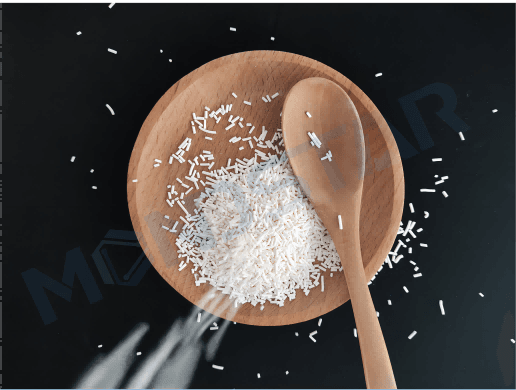Potassium Sorbate Buying Guide-FAQs about buying Potassium Sorbate
When it comes to what’s added to our food, safety is the foremost priority. This guide aims to clear up the top questions about potassium sorbate E202 – a common preservative you’ve likely eaten without even realizing!
We’ll talk in detail about how safe it is, potential side effects, specific uses like in winemaking, and address some other related concerns like; is it gluten-free?
Our goal is to serve you the info you need to make informed choices about E202 for you and your family.

Introduction of Potassium Sorbate additive
Potassium sorbate, also known by the E number E202, is a preservative that stops molds, yeasts, and bacteria from growing in foods and drinks.
Chemically, it’s potassium bound to sorbate ions. When added to stuff like wine, cheese, yogurt, breads, cakes, and fruit products, it breaks down into sorbic acid. Sorbic acid works by interfering with the enzymes microbes need to reproduce and function.
Potassium sorbate works best in acidic environments under pH 6.5, with optimum pH 3-5 when un-dissociated antimicrobial sorbic acid predominates. That’s the reason Potassium sorbate suits naturally acidic foods or ones with lemon/acetic acid. Only 0.025-0.1% is needed depending on the food.
Modern potassium sorbate comes from berries or is made synthetically by neutralizing sorbic acid with potassium hydroxide. Reviews agree its GRAS (Generally Recognized As Safe). When used properly to preserve packaged foods, juices, and booze, potassium sorbate safely stops molds, fungi and yeast from spoiling things.
Is potassium sorbate bad for you?
The FDA and food authorities say potassium sorbate is safe in allowed amounts. It’s Generally Recognized as Safe (GRAS). Many toxicity studies agree it doesn’t pose health risks like causing cancer, even at high doses.
The World Health Organization found potassium sorbate safe to ingest daily, even giving a wide safety margin. Typically 0.1% or less potassium sorbate, the common amount to preserve foods, stays well below limits for most people. While some sensitive people may rarely react, overall potassium sorbate has very few reported issues when used properly. But some worry that lifelong buildup from sorbates and additives needs more research.
Still, big reviews currently back its safety global agencies call non-toxic potassium sorbate crucial for food safety as an allowed preservative. As food additive use evolves, keeping an eye on intake makes sense. But right now, potassium sorbate looks safe to consume at prescribed highest amounts.
Potassium sorbate side effects
Used properly as a preservative, potassium sorbate seems non-toxic with minimal issues. Many animal tests confirm even huge doses, 1,000 times a human’s normal amount, appear not to damage genes, cause reproductive or developmental problems, or trigger cancer.
The World Health Organization (WHO) says up to 25 mg per kg body weight daily looks safe – far above the 0.1% in food. Though a few with specific intolerances might rarely react, most people stay well below the limits.
One thing – potassium sorbate can interact with cured meat nitrites, creating trace carcinogenic nitrosamines. But research finds the levels stay too low to worry about. While potassium sorbate breaks down easily in the body rather than building up, some want more research on low lifelong exposures. Still, globally, potassium sorbate is seen as low-risk at approved doses with a long history of apparently safe use. Checking intake levels can provide reassurance.
Potassium sorbate cancer
There’s no solid proof potassium sorbate triggers cancer in humans when used properly in food. Many animal studies confirm that even at very high doses, potassium sorbate does not appear carcinogenic. Tests show it does not cause potentially cancer-causing mutations or chromosome damage to mammalian cells.
After multiple reviews of long-term studies, the WHO finds no cancer risk concern over potassium sorbate. A few lab dish genotoxicity studies have resulted in favorable results, but living organisms show no such effects. As a natural antimicrobial, sorbic acid has a long history of safe human use too. Even so, some want more research on whether breakdown products or reactions with nitrites might create trace carcinogens after lifelong exposures. But for now, based on current data, big agencies say approved potassium sorbate food additive levels themselves do not pose a carcinogenic hazard directly. Continuing to monitor cumulative intake impacts could offer extra assurance.
How much potassium sorbate per gallon of wine?
Usually about 0.1% potassium sorbate, or 1.3 grams per gallon, is added to wine. Here’s a quick guide:
- 0.1% potassium sorbate prevents yeast and fungi growth in wine below pH 3.5. That rate works for most table wines.
- At 0.1%, that comes out to about 130 mg per liter or 490 mg per standard 750 mL bottle.
- The best amount can vary based on pH, wine type, aging, and spoilage risks. Some winemakers might use up to 0.2%.
- First dissolve the powder fully in wine so it spreads evenly when added to the full volume.
- Typically it’s added after the main or secondary fermentation when the wine is ready to bottle and stabilize.

Is potassium sorbate gluten free?
Yes, potassium sorbate is considered 100% gluten-free. This common food additive does not contain any gluten from wheat, barley, rye or other prohibited grains that people with celiac disease or gluten sensitivity need to avoid.
During manufacturing, potassium sorbate goes through a synthetic production process that doesn’t use any ingredients containing gluten.
Basically, potassium sorbate is just the potassium salt of sorbic acid. It’s made by chemically neutralizing sorbic acid with potassium hydroxide or potassium carbonate – all gluten-free ingredients.
Also, since potassium sorbate has a highly soluble crystal structure, there’s no risk of accidental gluten cross-contamination at the production facility, which could be a problem with granules.
Extensive testing has verified non-detectable levels of gluten in potassium sorbate products – no surprise since there are no scientifically sound sources to begin with. So potassium sorbate gets the gluten-free seal of approval. The Celiac Disease Foundation and other reputable groups have approved potassium Sorbate to be strictly gluten-free diets.
People who really need to avoid any gluten exposure, like those with celiac disease or wheat allergies, have no reason to worry about this common food additive. Potassium sorbate as a regulated additive, is gluten-free and celiac-safe.
Is potassium sorbate safe during pregnancy?
If you’re expecting, you’ve likely wondered about potassium sorbate in your food. This common preservative, also labeled E202 additive, gets a thumbs up from health agencies like the FDA. After looking at research on it, they haven’t found reproductive problems or safety issues for developing babies when moms consume normal amounts.
The daily limit set for potassium sorbate is 25 mg for each kg of body weight. And the typical tiny amounts added to foods make it unlikely people would ever go over this level. Still, some pregnant women prefer to play it extra safe and keep additives to a minimum. Smart thinking! Focusing on whole foods and a balanced diet is always a solid plan when you’ve got a little one on the way.
Potassium Sorbate in Personal Care Products
Potassium sorbate gets used a ton as a preservative in personal care items like shampoos, moisturizers, makeup, and contact lens solutions. It stops mold, yeast, and bacteria from growing, so these products last longer on store shelves before going bad.
The FDA and similar bodies say potassium sorbate is okay to use in self-care products safety-wise. It often gets used at between 0.1-0.5% strength. At those levels, most people probably won’t get skin irritation.
However, rarely, potassium sorbate can cause allergic reactions or skin sensitivity when used in cosmetics or skincare items. If you have any bad reactions, stop using the product and see a dermatologist if needed.
Potassium Sorbate and Food Allergies
While potassium sorbate is typically considered harmless to eat, some people can have bad allergic reactions or sensitivities to this additive. Symptoms might include rashes, itchy skin, upset stomach, and rarely, more serious stuff like a swollen throat or trouble breathing.
People prone to allergies or conditions like eczema seem to be most at risk of reacting to potassium sorbate. If you’ve got a history of food allergies or sensitivities, be extra careful and ask your doctor if you think potassium sorbate could be causing problems.
But it’s good to know that allergic reactions are very uncommon. Most people can eat foods with potassium sorbate without any issues.
E202 potassium sorbate certainly is able to live up to its reputation as a versatile, widely-used food preservative! It provides a strong defense against molds and yeasts to help foods and drinks stay fresh longer – including beloved vino. This specific additive tends to be pretty safe for us to eat in food and drink in beverages.
Potassium Sorbate is a super popular choice to keep foods from going bad quickly and to increase products shelf life. When buying it or other additives, look for trusted suppliers with experience.
For over 10 years, Mondstar has offered high-grade additives to preserve flavors and quality. As a leading Chinese provider, Mondstar supplies a wide range of compounds to suit different needs. Choosing a reputable source ensures your ingredients are effective and safe.
